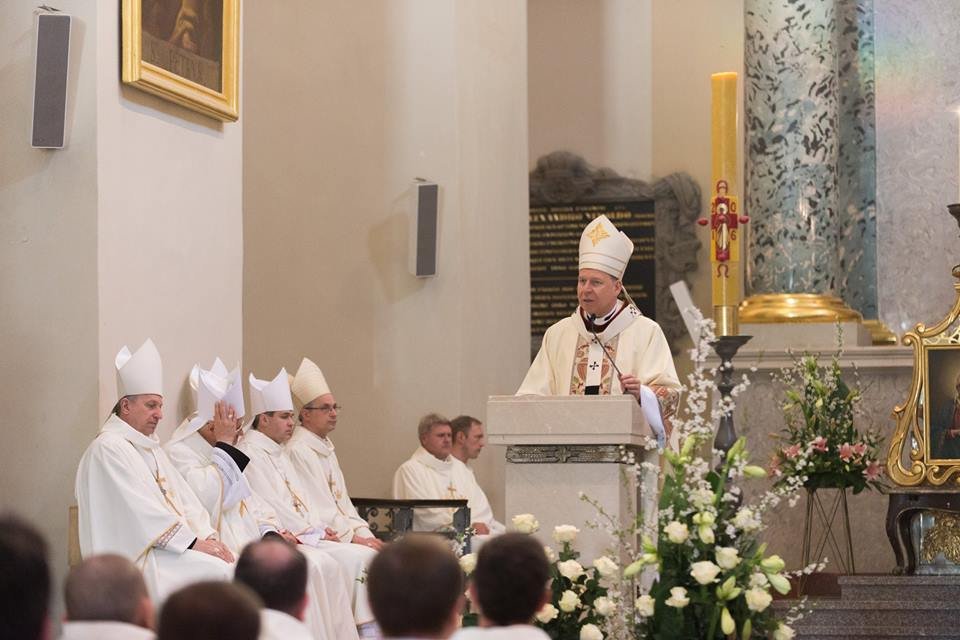Today’s liturgical readings urge us to reflect on how God calls individuals and nations into service and relationship throughout salvation history. In our first reading we have the story of the call of Elisha to leave his current life and follow the great prophet Elijah. A call that will eventually make him Elijah’s successor. He is offered the position, but must make the decision to leave his family and farming, his guarantee of sustenance, to respond to this divine call. In the Gospel, we see two of the apostles, James and John, who have already left everything to follow Jesus, but are still in the process of learning what that fully entails. Salvation history is all about God calling individuals and nations into relationship with their creator, into an ever-growing unity with God and with one another.
In the second reading, the apostle Paul reminds us of another aspect of that calling – “For freedom Christ set us free; so stand firm and do not submit again to the yoke of slavery.” He speaks of that spiritual freedom of the children of God – freedom from sin and freedom for right worship. That is also the primary purpose of nations striving in various ways to maintain their freedom from oppression, for a liberty that allows its citizens to live in peace and to worship God. As Paul taught Timothy, “First of all, then, I ask that supplications, prayer, petitions, and thanksgiving be offered for everyone, for kings and for all in authority, that we may lead a quiet and tranquil life in all devotion and dignity. This is good and pleasing to God our savior, who wills everyone to be saved and to come to knowledge of the truth.” (1Tim 2,1-4)
Today as we commemorate the 450th anniversary of the Treaty of Lublin, we recognize its important historic significance for our two nations, but we must also learn from its shortcomings. Through the centuries its significance has been interpreted in various ways by a wide-range of historians. On one hand, it was a great move seeking to strengthen our defences and guarantee our mutual freedom from outside aggressors; a pact between two Catholic nations providing many other benefits as well. But the human element was not missing either. The struggle to ensure that in seeking to achieve good goals, we do not use force and coercion, the same temptations faced by the two apostles in today’s gospel to send fire from heaven on the different minded elements within society. This is a lesson that we are still learning today in seeking to build a vast international community, a society seeking the common good.
Our common Catholic faith played an important role in establishing and maintaining this Union. Over the centuries the saints that we have in common also contributed to the strengthening of these ties between our two nations. These include St. Hedwig, St. Casimir, St. Raphael Kalinauskas-Kalinowski, St. Andrew Bobola, St. Faustina Kowalska, bl. Michael Sopocko, bl. George Matulaitis-Matulevič, bl Teofilius Matulionis and our most recent blessed to be proclaimed by the Church, who goes back to a century before the Union, bl. Michael Giedraitis-Giedrojc, for whom we have given thanks this month in joint celebrations, both in Cracow, where he served and is buried and in his homeland, Videniškiai. Commenting on the proclamation of bl. Michael, the Holy Father during the Regina Caeli on Pentecost Sunday said, “May this event encourage Poles and Lithuanians to strengthen their bonds in the sign of faith and of the veneration of Blessed Michael, model of evangelical humility and charity.” From these saints, we must also learn the process needed to achieve true community and the true union which our Lord desires.
The bonds that we strengthened in the Union of Lublin, a predecessor to the European Union, and the lessons of the past must also serve us in the present and for the future. As our nations were entering the European Union, St. John Paul II in 2003 spoke of this saying “The period from the Union of Lublin to the European Union represents a great synthesis, but this synthesis’ content is rich and varied. … It is a challenge that we and all the nations are confronted with at present, and which, on the wave of the political transformations in the region of the so-called Central-Eastern Europe, are emerging from the spheres of influence of atheistic Communism. This challenge, however, imposes a task on believers – the task of actively building the spiritual community, on the basis of the values that have made it possible to withstand decades of programmed efforts to introduce atheism.”
Even though the European Union did not acknowledge its Judeo-Christian roots in the Lisbon Treaty and continues in various legislation to move further away from these basic values that have been at the foundation of Europe over the centuries, drawing on our past history and our common faith, we should proclaim with missionary zeal the importance of these values to our common society today.
Pope Francis during his visit to Lithuania last September urged us to search for our roots, to draw strength and insight from them, to remember the witnesses of faith in our history and imitate them.
St. Paul reminds us today of our call for freedom – freedom for true worship and freedom from sin. In commemorating the Union of Lublin, let us use this occasion to renew our commitment and to respond to our calling not only as individual Catholics, but as Catholic nations, to engage our society for the common good of all its people, to build a true communion based on our Christian faith and our Christian values.
ARCHBISHOP GINTARAS GRUŠAS
HOMILY IN THE MASS, COMMEMORATING 450 YEARS OF THE UNION OF LUBLIN, 2019 JUNE 30
